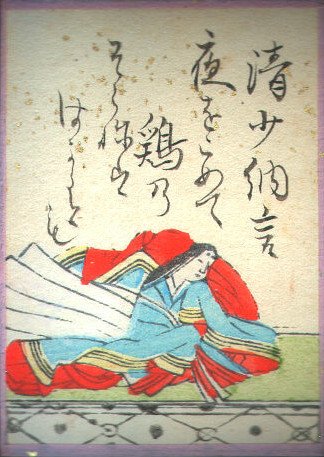Lists have a long history in literature, dating back to Sumerian times with a king’s instructions to his son on how to live a good life, with advice like, “the eyes of the slanderer always move around as shiftily as a spindle. You should never remain in his presence” and “You should not pass judgment when you drink beer.”
A famous Japanese court lady named Sei Shonagon wrote lists in her journal including “Things That Make the Heart Beat Faster,” “Awkward Things,” and “Hateful Things.”
Poems, essays, and stories in the form of lists can be advice, complaints, to-do lists, things people carry with them, or a list of contrasts between a husband and wife. Lists tend to capture the experience of life without a lot of self-reflection, but they can have an intimate, confessional quality and the personalities of the list makers shine through.
Here are excerpts from some famous literary lists, starting with an excerpt from The Pillow Book, the journal of court lady Sei Shonagon’s in 10th century Japan.

Excerpts from “Hateful Things” by Sei Shonagon
One is in a hurry to leave, but one's visitor keeps chattering away. If it is someone of no importance, one can get rid of him by saying, "You must tell me all about it next time"; but, should it be the sort of visitor whose presence commands one's best behavior, the situation is hateful indeed.
One finds that a hair has got caught in the stone on which one is rubbing one's inkstick, or again that gravel is lodged in the inkstick, making a nasty, grating sound.
Someone has suddenly fallen ill and one summons the exorcist. Since he is not at home, one has to send messengers to look for him. After one has had a long, fretful wait, the exorcist finally arrives, and with a sigh of relief one asks him to start his incantations. But perhaps he has been excorcizing too many evil spirits lately, for hardly has he installed himself and begun praying when his voice becomes drowsy. Oh, how hateful!
A man who has nothing in particular to recommend him discusses all sorts of subjects at random as though he knew everything.
One is just about to be told some interesting piece of news when a baby starts crying.
A person who recites a spell himself after sneezing. In fact I detest anyone who sneezes, except the master of the house.
I cannot stand people who leave without closing the panel behind them.
Ladies-in-waiting who want to know everything that is going on.
A lover who is leaving at dawn announces that he has to find his fan and his paper. "I know I put them somewhere last night," he says. Since it is pitch-dark, he gropes about the room, bumping into the furniture and muttering, "Strange! Where can they be?" Finally he discovers the objects. He thrusts the paper into the breast of his robe with a great rustling sound; then he snaps open his fan and busily fans away with it. Only now is he ready to take his leave. What charmless behavior! "Hateful" is an understatement.
Excerpts from “He and I” by Natalia Ginzburg
He always feels hot, I always feel cold. In the summer when it really is hot he does nothing but complain about how hot he feels. He is irritated if he sees me put a jumper on in the evening.
He has an excellent sense of direction, I have none at all. After one day in a foreign city he can move about in it as thoughtlessly as a butterfly. I get lost in my own city; I have to ask directions so that I can get back home again.
I love the cinema too; but although I have been seeing films for years I haven’t been able to provide myself with any sort of cinematic education. But he has made an education of it for himself and he does this with whatever attracts his curiosity; I don’t know how to make myself an education out of anything, even those things that I love best in life; they stay with me as scattered images, nourishing my life with memories and emotions but without filling the void, the desert of my education.
If I loved music I would love it passionately. But I don’t understand it, and when he persuades me to go to concerts with him my mind wanders off and I think of my own affairs. Or I fall sound asleep.
Now and again he is ill with some mysterious ailment of his own; he can’t explain what he feels and stays in bed for a day completely wrapped up in the sheets; nothing is visible except his beard and the tip of his red nose. Then he takes bicarbonate of soda and aspirins in doses suitable for a horse, and says that I cannot understand because I am always well, I am like those great fat strong friars who go out in the wind and in all weathers and come to no harm; he on the other hand is sensitive and delicate and suffers from mysterious ailments. Then in the evening he is better and goes into the kitchen and cooks himself tagliatelle.

Photo by Forrest Gander
Excerpts from “Living” by C. D. Wright
If this is Wednesday, write Lazartigues, return library books, pick up passport form, cancel the paper.
If this is Wednesday, mail B her flyers and K her shirts. Last thing I asked as I walked K to her car, “You sure you have everything?” “Oh yes,” she smiled, as she squalled off. Whole wardrobe in front closet.
Go to Morrison’s for paint samples, that’s where housepainter has account (near Pier One), swing by Gano St. for another bunch of hydroponic lettuce. Stop at cleaners if there’s parking.
Need coat hooks and picture hangers for office. Should take car in for air filter, oil change. F said one of back tires low. Don’t forget car payment, late last two months in a row.
If this is Wednesday, there’s a demo on the green at 11. Took B to his first down at Quonset Point in August. Blue skies. Boston collective provided good grub for all. Long column of denims and flannel shirts. Smell of patchouli made me so wistful, wanted to buy a woodstove, prop my feet up, share a J and a pot of Constant Comment with a friend. Maybe some zucchini bread.
Keep an eye out for a new yellow blanket. Left B’s on the plane, though he seems over it already. Left most recent issue of Z in the seat. That will make a few businessmen boil. I liked the man who sat next to me, he was sweet to B. Hated flying, said he never let all of his weight down.
No matter where I call home anymore, feel like a boat under the trees. Living is strange.
This week only; bargain on laid paper at East Side Copy Shop.
Woman picking her nose at the stoplight. Shouldn’t look, only privacy we have anymore in the car. Isn’t that the woman from the colloquium last fall, who told me she was a stand-up environmentalist. What a wonderful trade, I said, because the evidence of planetary wrongdoing is overwhelming. Because because because of the horrible things we do.
If this is Wednesday, it’s trash night.
Excerpts from “Girl” by Jamaica Kincaid
Always eat your food in a way that it won’t turn someone else’s stomach; on Sundays try to walk like a lady and not like the slut you are so bent on becoming… don’t eat fruits on the street --- flies will follow you.. this is how to sew on a button; this is how to make a buttonhole for the button you have just sewn on; this is how to hem a dress when you see the hem coming down and so to prevent yourself from looking like the slut I know you are so bent on becoming; this is how you iron your father’s khaki shirt so that it doesn’t have a crease; this is how you iron your father’s khaki pants so that they don’t have a crease; this is how you grow okra – far from the house, because okra tree harbors red ants; when you are growing dasheen, make sure it gets plenty of water or else it makes your throat itch when you are eating it; this is how you sweep a corner; this is how you sweep a whole house; this is how you sweep a yard; this is how you smile to someone you don’t like very much; this is how you smile to someone you don’t like at all; this is how you smile to someone you like completely… this is how to spit up in the air if you feel like it; this how to move quick so that it doesn’t fall on you; this is how to make ends meet; always squeeze bread to make sure it’s fresh; but what if the baker won’t let me feel the bread?; you mean to say that after all you are really going to be the kind of woman who the baker won’t let near the bread?
Excerpts from “The Things They Carried” by Tim O’Brien
The things they carried were largely determined by necessity. Among the necessities or near-necessities were P-38 can openers, pocket knives, heat tabs, wrist watches, dog tags, mosquito repellant, chewing gum, candy, cigarettes, salts tablets, packets of Kool-Aid, lighters, matches, sewing kits, Military Payment Certificates, C rations, and two or three canteens of water. Together, these items weighed between fifteen and twenty pounds, depending upon a man’s habits or rate of metabolism. Henry Dobbins, who was a big man, carried extra rations; he was especially fond of canned peaches in heavy syrup over pound cake. Dave Jensen, who practiced field hygiene, carried a toothbrush, dental floss, and several hotel-size bars of soap he’d stolen on R&R in Sydney, Australia. Ted Lavender, who was scared, carried tranquilizers until he was shot in the head outside the village Than Khe in mid-April. By necessity, and because it was SOP, they all carried steel helmets that weighed five pounds including the liner and camouflage cover. They carried the standard fatigue jackets and trousers. Very few carried underwear. On their feet they carried jungle boots – 2.1 pounds – and Dave Jensen carried three pairs of socks and a can of Dr. Scholl’s foot powder as a precaution against trench foot. Until he was shot, Ted Lavender carried six or seven ounces of premium dope, which for him was a necessity. Mitchell Sanders, the RTO, carried condoms. Norman Bowker carried a diary. Rat Kiley carried comic books. Kiowa, a devout Baptist, carried an illustrated New Testament that had been presented to him by his father, who taught Sunday school in Oklahoma City, Oklahoma. As a hedge against bad times, however, Kiowa also carried his grandmother’s distrust of the white man, his grandfather’s old hunting hatchet. Necessity dictated. Because the land was mined and booby-trapped, it was SOP for each man to carry a steel-centered, nylon-covered flak jacket, which weighed 6.7 pounds, but which on hot days seemed much heavier. Because you could die so quickly, each man carried at least one large compress bandage, usually in the helmet band for easy access.



Upvote for fellow vegan :-)
Peter Greenaway adapted "The Pillow Book" for cinema. Quite a challenge, methinks! Have you seen it? I don't. But i really want to read that book.
The book is wonderful. It's what inspired me to write this post. I haven't seen the movie... I'm a little afraid I won't like it. :)